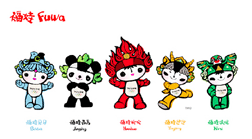Beijing Huan Ying Ni
Welcome to Beijing
by Ying Wang
I am happy and proud to be one of 1.3 billion Chinese. I spent 24 enjoyable years in Beijing before coming to America in 2007 to learn about your culture and people.
Now, I want to be your eyes to China. 
The Beijing Olympics starting next week provide a great opportunity for people from all over the world to have a closer look at China and our people. Chinese are all excited as we get ready to open our doors to the world.
The slogan of the Beijing Olympics is One World, One Dream, to express the idea that we belong to one world and hold one dream of living on a peaceful, friendly and harmonious Earth, however many cultural differences we have or distinct values we hold — and whatever languages we speak or races we are.
We like cartoon figures in China, so we’ve created a family of them to stand for the values we bring to the Olympics, which are about competition, cooperation and inspiration; about fulfilling goals, reaching one’s dreams and presenting strong will and strength.
Fuwa, the official Mascots of the Beijing 2008 Olympic Games, convey a message of friendship and peace. They embody the natural traits of the Olympic flame and China’s most popular animals: Beibei, the Fish; Jingjing, the Panda; Huanhuan, the Olympic Flame; Yingying, the Tibetan Antelope; and Nini, the Swallow.
Now, put their name’s together —Beijing Huan Ying Ni — to mean: Welcome to Beijing.
Let me get you closer and lead you through my hometown, Beijing.
Beijing, home to 16 million people, has long been the political, cultural and diplomatic center of China. Our national historical heritage — the Great Wall, the Summer Palace, the Temple of Heaven, Yuan Ming Yuan Park in Beijing — all reflect China’s height of our culture. The city has constructed more and more modern buildings in recent years. So when you walk on the streets, you will find both old and new styles of architecture.
Beijing is a city of good food as well as ancient and modern landmarks. The most popular is Peking roast duck, which has been prepared since the Yuan Dynasty of the 13th century. To eat Peking duck, you roll Chinese pancakes with spring onions, special sauce and thin, crispy duck meat. Soymilk, fried dough, Luzhu, Tangerduo and many barbecues are some of the irresistible traditional foods. Snack restaurants thrive all over Beijing. We are famous for our snack streets, and you can happily fill your stomach while walking along city streets.
When the sun goes down, people start moving around and enjoying the night life. Chinese people traditionally take walks by the side of the road or in the park after dinner. There is an old saying in China: Walking one hundred steps after a meal, one can live up to 99. Middle-aged and older people go dancing in parks, while many young people get together to sing songs in KTV, or karaoke houses, which can store up to 100,000 songs. As it gets darker, many energetic people head to bars and clubs. Sanlitun Bar Street and Houhai are two places young people often visit. Some restaurants are still full of people around midnight.
Don’t be surprised or uneasy when Chinese people stare at you while you are walking on the street or riding on a bus. Many Chinese seldom see people with blond hair, blue eyes and the more pronounced noses of the West, so don’t be offended. You will find most Chinese are friendly. Some will even walk up to you and start talking English to you.
There will never be enough words to tell you everything about Beijing. So if you want to know more, then go there to see, hear, taste and feel for yourself. At the same time, I and my 1.3 billion Chinese cousins welcome you to share the joy and charm of the Beijing 2008 Olympics.
Ying Wang, from Beijing, China, came to the United States as an au pair after finishing her college degree and teaching English for three years. A summer intern at Bay Weekly through Anne Arundel Community College, she plans to study for a master’s degree in broadcast journalism.